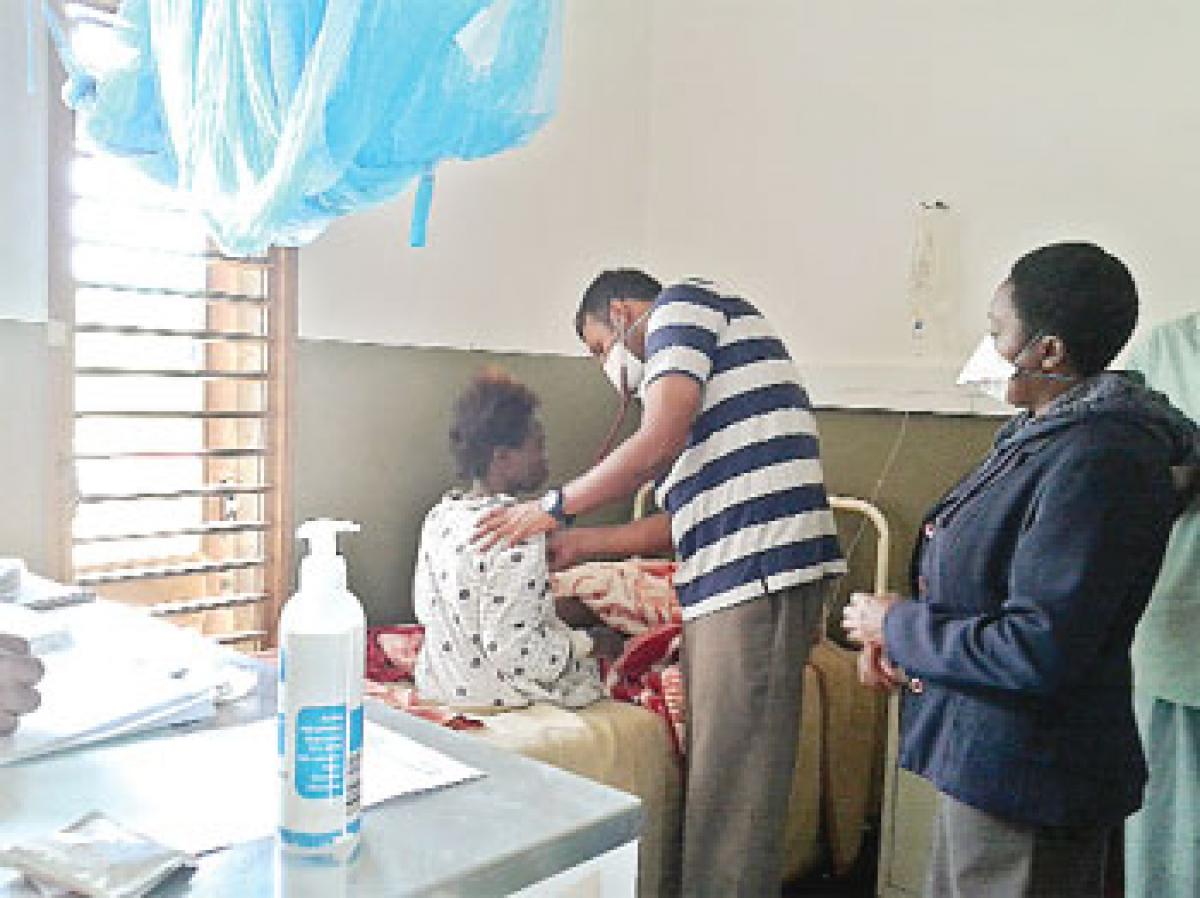Live
- About 62 lakh foreign tourists arrived in India in 8 months this year: Govt
- IPL 2025 Auction: Gujarat bag Sherfane Rutherford for Rs 2.60 cr; Kolkata grab Manish Pandey for Rs 75 lakh
- Assam CM meets Governor, cabinet expansion on the cards
- IPL 2025 Auction: RCB buy Jacob Bethell for Rs 2.6 cr; Ellis sold to CSK for Rs 2 crore
- Commercial coal mines register highest-ever single day dispatches at 0.62 million tonnes
- More German companies adopting AI applications: statistics
- NASA Issues Warning About 170-Foot Asteroid Heading Towards Earth at 47,644 KM/H
- One killed, three injured in cargo plane crash near Vilnius airport
- PM Modi opens global cooperative meet, launches UN International Year of Cooperatives 2025
- 17 missing after safari boat sinks in Egypt's Marsa Alam
Just In

Driven by a passion to serve the poor and needy from his childhood, Dr Srinivas Rao Ghattamaneni, a native of Bhadrachalam in Telangana, is not your typical doctor.
Driven by a passion to serve the poor and needy from his childhood, Dr Srinivas Rao Ghattamaneni, a native of Bhadrachalam in Telangana, is not your typical doctor. In his pursuit to help people, who cannot afford medical care, he quit a lucrative job at a corporate hospital and joined Médecins Sans Frontières (MSF) (better known as Doctors Without Borders) in 2009.
Taking about his fledgling days as a doctor he says, “I started my career with corporate hospitals as I wanted to gain some experience. Being a native of Bhadrachalam, I have seen the travails of people to access the health care. People in villages and remote areas do not get proper medical facilities. Having seen that state of childhood was what drove me to serve people.”
Sharing his journey with MSF the 36-year-old doctor says, “When I found out that MSF is working in Bhadrachalam and nearby areas and they are going into forests to provide medical care, I approached the organisation and fortunately, I got a chance to work with them in October, 2009.”
MSF is working in India since 1999 and is providing medical treatment to thousands of patients in Andhra Pradesh, Bihar, Chhattisgarh, Delhi, Jammu and Kashmir, Maharashtra, Telangana, Manipur and West Bengal. It is a volunteer organisation and they don’t pay as much as the corporate hospitals shell out but Rao says that it is a nonissue because it is a humanitarian organisation.
“It is not about money, the satisfaction in serving people beats the money lust. There are many cases of malnutrition in Bhadrachalam, parents of one such child, walked for one-and-a-half-day to reach our clinic. If you see that kind of situation and you feel that you are doing a job for a good cause, money does not matter,” he asserts with pride.
“My parents never opposed my decisions. The MSF is doing a great work in 80 countries and, they are happy that I am working towards a humanitarian cause,” he adds. MSF has been providing independent medical relief to victims of war, disasters and disease outbreaks, since 1971. The organisation works in resource-limited settings and they go to villages and forests to provide medical aid.
“We do everything by ourselves from setting up the clinic to providing treatment. In case of emergency, we refer the patient to the nearest healthcare centre. We work closely with the Ministry of Health and try to eliminate problems by empowering people. Our organisation pays for the transport and medical expenses if we refer a patient to a hospital. The MSF sees that the patient should not shell out even a single rupee for treatment,” shares Dr Rao.
Recalling his first overseas mission in Uzbekistan, he recollects, “I was posted as a TB specialist doctor in Uzbekistan. There were a few concerns like patients used to miss doses as the settings were too far for them. These kinds of things existed from a long time and we tried to minimise it, by counselling the patients and by providing transport money or some kind of incentives to them so that they could get the medicines.”
Speaking about his stint in Swaziland – the country whose population faces major health issues apart from HIV/AIDS and tuberculosis, Dr Rao says, “As of 2013, the African nation has an estimated life expectancy of 50 years. In Swaziland, I was doing a more hands on job when compared to Uzbekistan.”
“The MSF is doing studies there to reduce TB and results are promising. In Swaziland, we are trying to cut down the duration of treatment. We are trying to give optimal treatment in minimum time,” the doctor adds. “Right now, I am going as a medical team leader and it is a management position. I will manage staff and doctors. There is a high HIV prevalence in Swaziland and we are trying to support the government structure to reduce the outbreak,” he signs off.
Journey with MSF
Rao began his journey with MSF as a field doctor for a project in the border of AP, TS and Chhattisgarh and worked for three years. Later, he went on to work as a TB doctor in MSF's project in Uzbekistan treating MDR-TB/XDR-TB (severe forms of tuberculosis) for a year.
From March-December 2015, he worked in Swaziland, where he played a pivotal role in operational research in DRTB and was responsible for treating patients, who needed emergency critical care. Dr Srinivas recently went back to Swaziland as a medical team leader and is handling a team of doctors and staff in the African country.

© 2024 Hyderabad Media House Limited/The Hans India. All rights reserved. Powered by hocalwire.com







